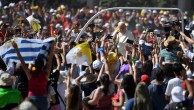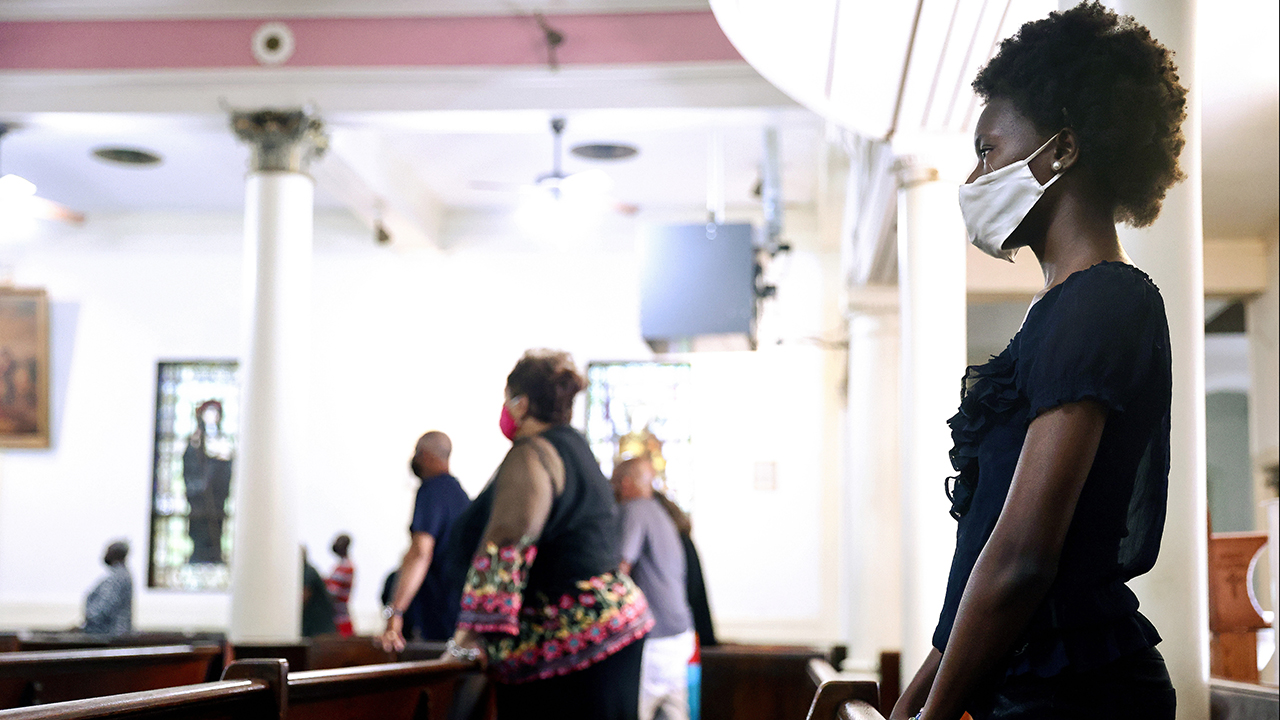
The goal of this report is to delve into the religious experiences of Black Catholics. It’s a follow-up to a February 2021 report, “Faith Among Black Americans,” that examined the role of religion in the lives of Black Americans as a whole. Both reports rely on data from a Pew Research Center survey of 8,660 Black adults (ages 18 and older), including 562 Black Catholics, conducted from Nov. 19, 2019, to June 3, 2020. The survey was designed with a very large sample to allow researchers to dig into subgroups, such as Black Catholics, that are too small to be analyzed in most national surveys.
How did we define the racial/ethnic categories used in this report? Black adults are respondents who identify as Black or African American, including those who identify as both Black and Hispanic, or as Black and another race (such as Black and White, or Black and Asian American). The White adults category includes only single-race, non-Hispanic, White respondents. In general, Hispanic adults can be any race. But in this report, people who identify as both Black and Hispanic are included in the Black category, and not in the Hispanic category, to ensure that no respondent is counted in more than one category.
To obtain a large, nationally representative sample of Black Americans, the “Faith Among Black Americans” survey drew from four sources: Pew Research Center’s American Trends Panel (conducted online), NORC’s AmeriSpeak panel (conducted online or by phone), Ipsos’ KnowledgePanel (conducted online) and a national cross-sectional survey by the Center (conducted online and by mail). For more information, see the Methodology. The exact wording of the questions used in this analysis can be found here.
In addition to the 2019-2020 survey described in “Faith Among Black Americans,” some analysis in this report draws on an annual profile survey conducted Aug. 3-16, 2020, among members of the Center’s American Trends Panel. Details about methods used for ATP surveys are available here.
Black Catholics are a minority in the United States in numerous ways. They comprise a small share of Black adults (6%) and an even smaller share of Catholic adults (4%). Still, there are approximately 3 million Black Catholics in the U.S., and the group received media attention after Wilton Gregory, the archbishop of Washington, D.C., became the first Black American cardinal in 2020.
A recent Pew Research Center study designed to capture the diversity of Black American religious life offers new insights into Black Catholics’ religious habits and experiences, finding that their experiences at parishes and at Mass are often distinctive from those of other U.S. Catholics. It also shows that their religious beliefs and practices differ from those of Black Protestants.
One way the religious experience of Black Catholics stands out is that they are a lot less likely than White or Hispanic Catholics – who together make up the vast majority of U.S. Catholics – to worship in parishes where most people share their race or ethnicity.
Just 25% of Black Catholics who attend Mass at least a few times a year report that they typically go to a Mass where most other attendees are Black. That compares with 80% of White Catholic churchgoers who worship where most attendees are White and 67% of Hispanic Catholic church attenders who worship where most attendees are Hispanic.
In this way, Black Catholics also tend to have very different experiences than Black Protestants, who make up the majority of Black Christians in the U.S. About two-thirds of Black Protestants who attend church at least a few times a year (68%) say they routinely worship where most other attendees are Black. Many Black Protestants belong to historically Black Protestant denominations, such as the National Baptist Convention and the African Methodist Episcopal Church, which were formed during the 19th century when Black Americans could not freely worship elsewhere. Others attend nondenominational Black congregations or Black congregations in majority White denominations.
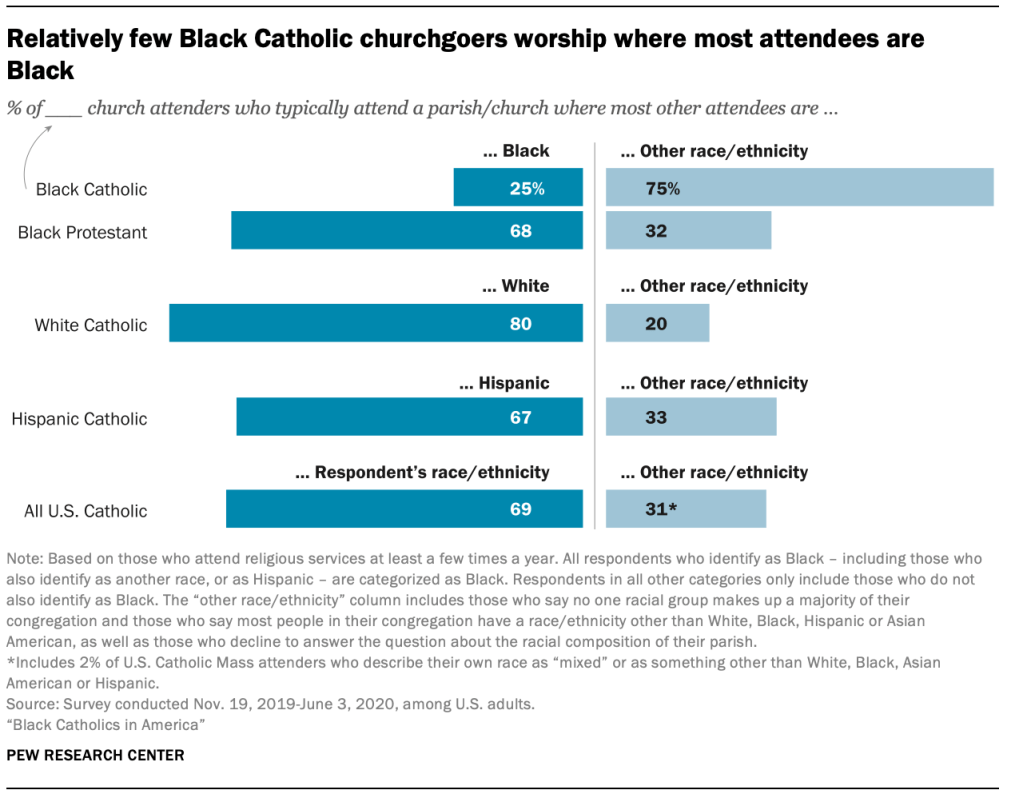
While relatively few Black Catholics attend predominantly Black parishes, Black Catholics express some distinctive preferences and expectations about their congregations. For example, they are more likely than White or Hispanic Catholics to say they think it is essential that churches offer a sense of racial affirmation, as well as to say it is essential that churches assist people who need help with bills, housing or food. And Black (40%) and Hispanic Catholics (42%) are more likely than White Catholics (18%) to say it is essential that churches teach practical job and life skills, and that they offer sermons that address political topics such as immigration and race relations.
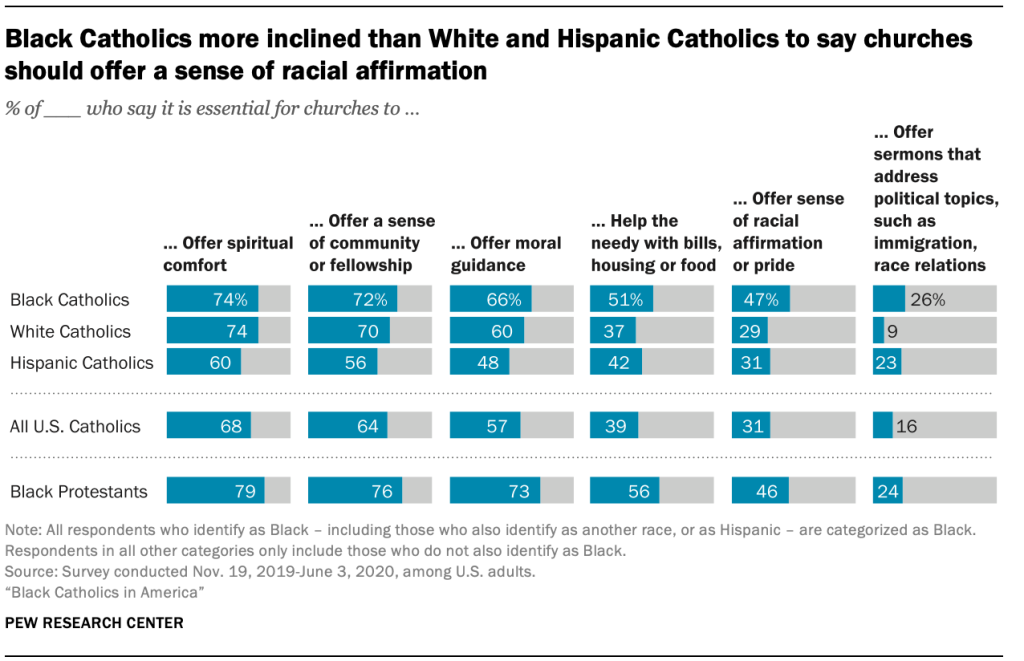
In addition, the majority of Black Catholics say that opposing racism is important to how they think about being Christian. About three-quarters of Black Catholics (77%) say opposition to racism is essential to what being Christian means to them. Most Black Catholics also say opposition to sexism (75%) and believing in God (73%) are essential to what being Christian means to them, while much smaller shares say attending religious services regularly (26%), opposing abortion (22%) and avoiding sex before marriage (16%) are essential to their Christian faith.
Black Catholics are a little more likely than White or Hispanic Catholics to say that opposing racism and sexism are essential to what being a faithful Christian means to them. They are about as likely as Black Protestants to say that opposing discrimination is essential to their faith, but they are somewhat less likely than Black Protestants to view regular church attendance, belief in God and avoiding sex before marriage as essential to their religious identity.
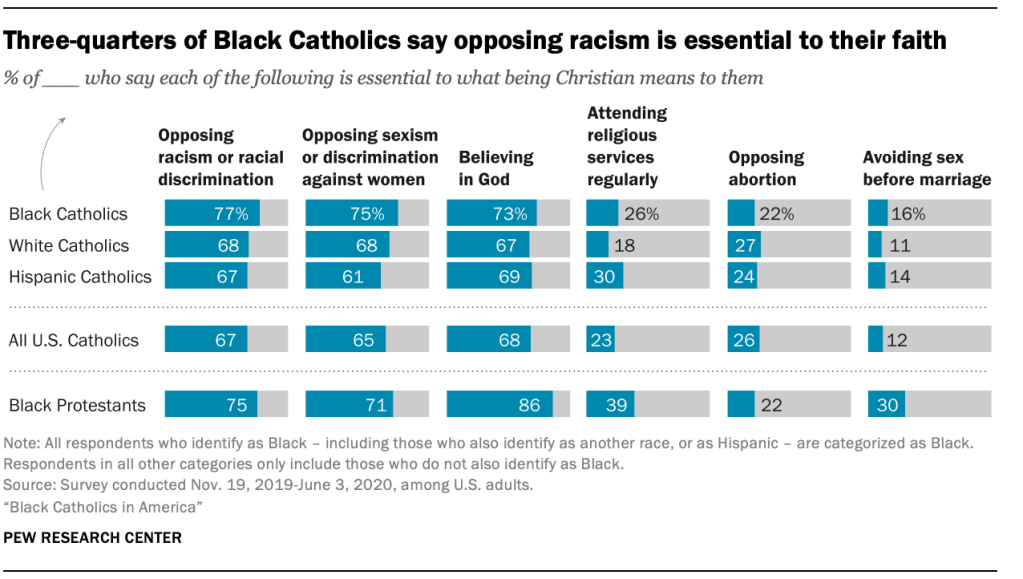
Movement into and out of Catholicism
The survey finds that 16% of Black Catholics are converts to the faith – people who identify as Catholic now, though they were raised in another religious tradition or as religiously unaffiliated. The share of Black Catholics who are converts to Catholicism is higher than the share of White or Hispanic Catholics who are converts.
That said, the share of Black Americans who were raised as Catholics and remain Catholics is lower than the corresponding shares of Hispanic and White Catholics. Roughly half of Black adults who were raised Catholic still identify as Catholic (54%), compared with 61% of White adults and 68% of Hispanic adults who were raised as Catholics and still identify with the faith.
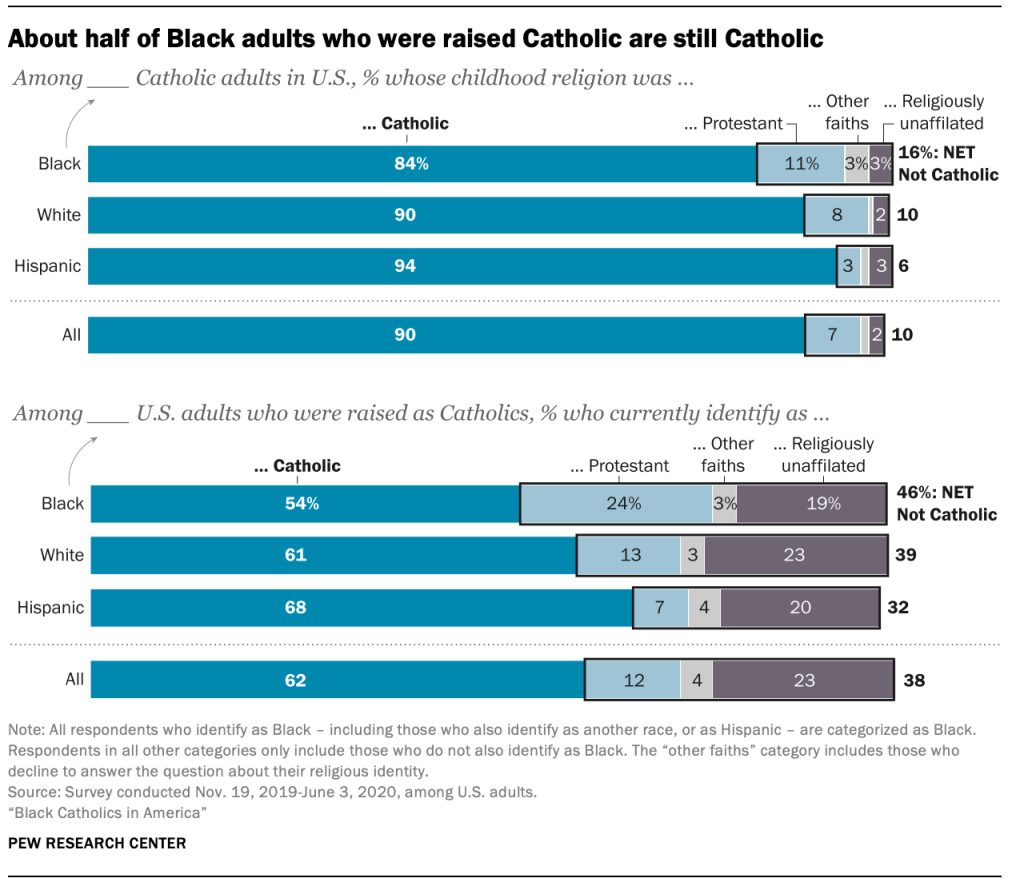
Furthermore, the survey shows that among Black adults, there are more people who have left Catholicism than have come to the faith. Overall, 4% of Black Americans say they were raised Catholic and no longer identify as such, while 1% of Black adults are converts to Catholicism.
A similar pattern prevails among U.S. Catholics as a whole. The Center’s 2014 Religious Landscape Study found that 13% of all U.S. adults are former Catholics – people who left Catholicism after having been raised in the church – while 2% of U.S. adults have become Catholic after being raised in another religion (or no religion). The same study found that Catholicism had experienced the greatest net losses due to religious switching of any Christian religious tradition in the U.S. as of 2014.
These are among the key findings of a new Pew Research Center analysis of the characteristics of Black Catholics. The analysis draws largely on a survey conducted Nov. 19, 2019-June 3, 2020, among a nationally representative sample of 13,234 adults, including 8,660 Black Americans. The survey was designed to capture the diversity of Black religious life in the U.S., allowing for a detailed look at the religious views and experiences of Black subgroups. A broad overview of the survey’s findings is available in the 2021 report “Faith Among Black Americans.” While this new analysis focuses specifically on Black Catholics, it also incorporates data on White and Hispanic Catholics, as well as on Black Protestants, for comparison purposes.
While Protestantism historically has dominated the Black religious landscape in the U.S., Catholicism has long had a significant presence among Black Americans. For example, Pierre Toussaint, a leader in New York City charities in the 1800s, was the first lay Catholic buried in the crypt of that city’s St. Patrick’s Cathedral. The Black Catholic population grew in the early and mid-20th century when Black Americans migrated from the rural South to cities across the country with large preexisting Catholic populations and, in many cases, strong parochial school systems. In more recent years, immigration from Africa and the Caribbean further boosted the Black Catholic population.1
Attendance and experiences at Mass for Black Catholics
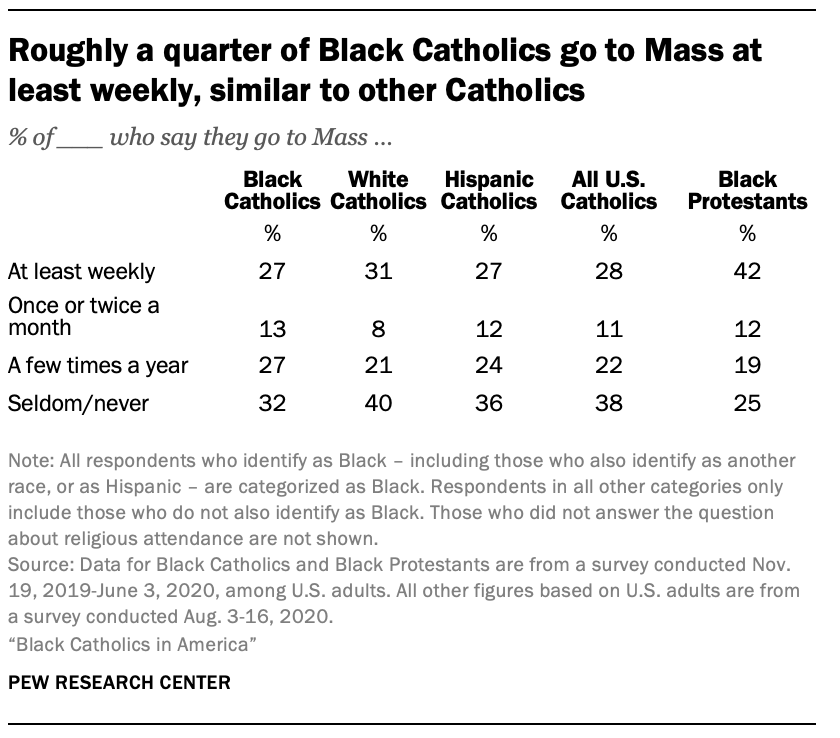
The Center’s new analysis finds that Black Catholics are about as likely as other Catholics to attend Mass at least once a week: Roughly a quarter of Black and Hispanic Catholics say they attend Mass at least weekly, as do 31% of White Catholics. And Black Catholics are less likely than White Catholics to say they seldom or never attend Mass.
While the share of Black Catholics who attend Mass weekly is similar to that of other Catholics, the survey suggests that their experiences while at Mass differ from those of White and Hispanic Catholics in certain ways.
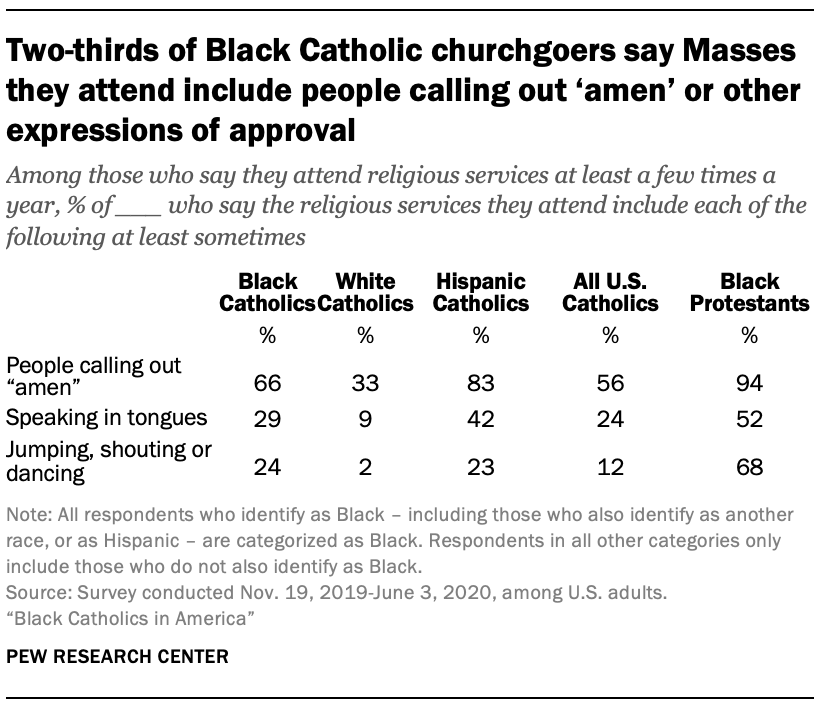
Black Catholics who attend Mass at least a few times a year are more likely than their White counterparts to say they attend services where other attendees often or sometimes call out “amen” or other expressions of praise (66% vs. 33%). They are also more likely than White Catholic churchgoers to say their experiences at least sometimes include two practices often associated with a charismatic style of worship: speaking or praying in tongues (29% vs. 9%) and jumping, shouting and dancing spontaneously during the service (24% vs. 2%). At the same time, among churchgoers, Black Catholics are somewhat less likely than Hispanic Catholics to experience people calling out “amen” and speaking in tongues at Mass, and they are much less likely than Black Protestants to say these things are typically present at their worship services.
Black Catholics also travel farther to get to their services – 41% of Black Catholic attenders report traveling more than 15 minutes to get to their parish, compared with smaller shares among White (26%) and Hispanic (30%) Catholics.
And the services attended by Black Catholics tend to be longer than those attended by White Catholics. Roughly a third of Black Catholic attenders (36%) say the services at their parish typically last at least 1.5 hours, as do 31% of Hispanic Catholics. By contrast, just 9% of White Catholics say the Masses they attend generally last 90 minutes or longer. Majorities in all three groups say their services are an hour or less, though Black (62%) and Hispanic (68%) Catholics are less likely than White Catholics (91%) to say this.
At the same time, Black Catholics tend to have shorter services than Black Protestants. The vast majority of Black Protestant churchgoers (80%) say the services they attend typically last 90 minutes or more.
What Black Catholics report hearing from the pulpit differs in many cases from what other Catholics say they hear in sermons. For example, Black Catholics are more likely than White and Hispanic Catholics to say they heard a sermon, lecture or group discussion in the past year about race relations or criminal justice reform. Roughly four-in-ten Black Catholics report having heard a discussion at church about race relations or racial inequity during the 12 months prior to the survey, compared with 29% of Hispanic Catholics and 18% of White Catholics.
At the same time, Black Catholics are less likely to say they heard sermons on abortion than are White and Hispanic Catholics. Roughly a third of Black Catholics (35%) say they heard a sermon, lecture or discussion about abortion in the 12 months prior to the survey, compared with half of White (50%) and Hispanic (51%) Catholics.
Black Catholics are less likely than Hispanic Catholics, but more likely than White Catholics, to have heard sermons or discussion about immigration at church.
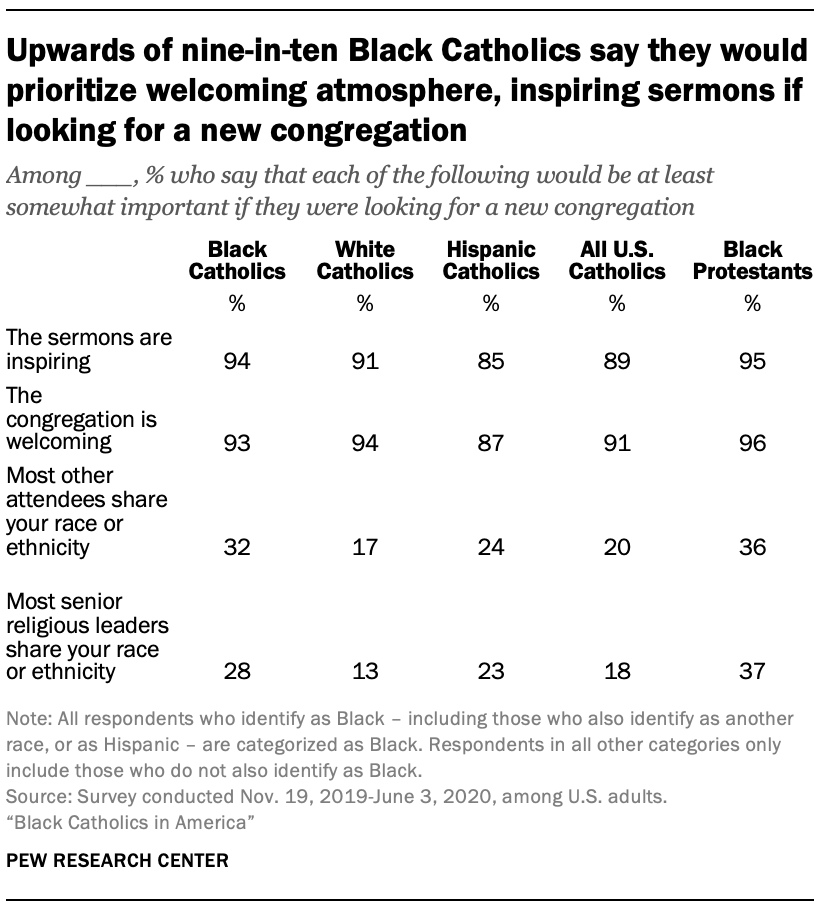
If they had to find a new church, nearly all Black Catholics say finding a “welcoming” congregation would be either very important (76%) or somewhat important (16%) to their choice. A similar share say it would be very (75%) or somewhat (20%) important for the parish to offer sermons that are inspiring.
By comparison, only about a third of Black Catholics say that having most of the other attendees share their race would be at least somewhat important (32%) to their choice of a new church, while two-thirds say it would be “not too” (30%) or “not at all” important (36%). Black Catholics give similar priority to finding a congregation where most of the clergy share their race.
Personal devotion
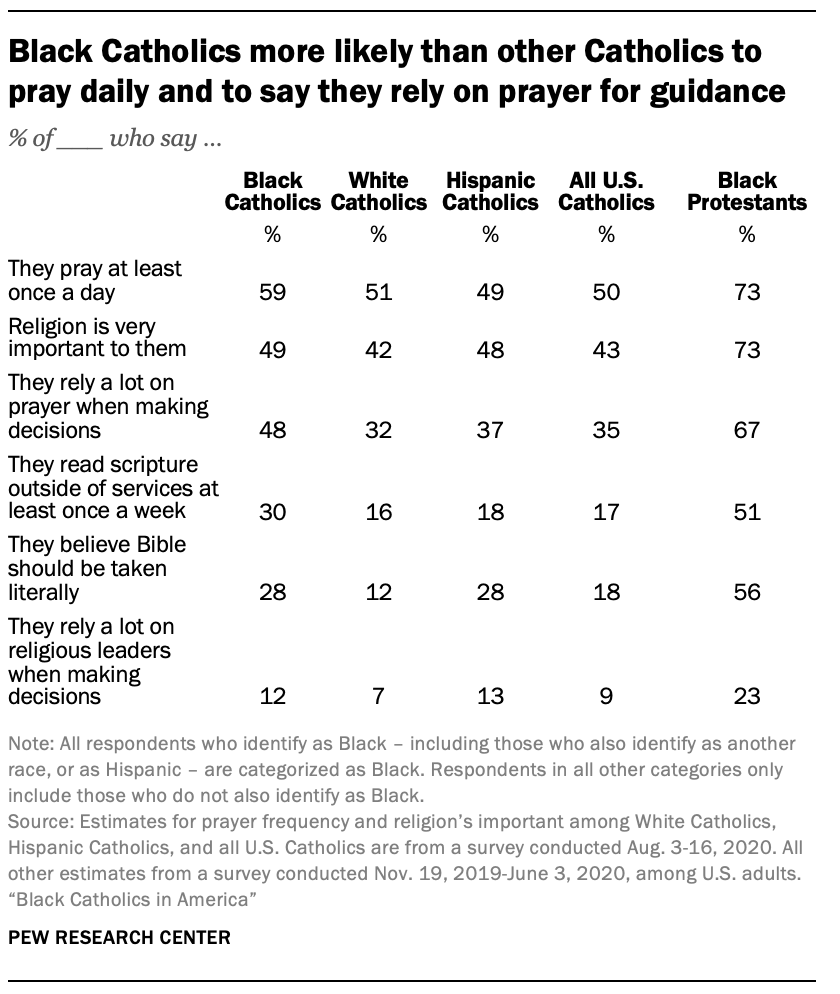
While Black Catholics attend Mass at rates similar to White and Hispanic Catholics, the survey finds higher levels of individual religious practice among Black Catholics by some measures.
About six-in-ten Black Catholics (59%) say they pray at least once a day, while roughly half (49%) say that religion is very important in their lives. Black Catholics are somewhat more likely than White and Hispanic Catholics to say they pray every day, and somewhat more likely than White Catholics to say religion is very important to them.
Black Catholics also are more likely than other Catholics to rely “a lot” on prayer for guidance in major life decisions. Nearly half of Black Catholics (48%) say they do this, compared with around four-in-ten Hispanic Catholics (37%) and about a third of White Catholics (32%).
There are additional differences by race and ethnicity when it comes to reading scripture outside of religious services. Three-in-ten Black Catholics say they do this at least once a week, compared with 16% of White Catholics and 18% of Hispanic Catholics. Black Catholics also are more likely than White Catholics to say the Bible should be taken literally (28% vs. 12%).
While Black Catholics tend to be more religious than White Catholics on these measures, they tend to be less religious than Black Protestants, who are much more likely to pray at least daily (73%), to say religion is very important in their lives (73%) and to read scripture at least once a week (51%).
Social and political views
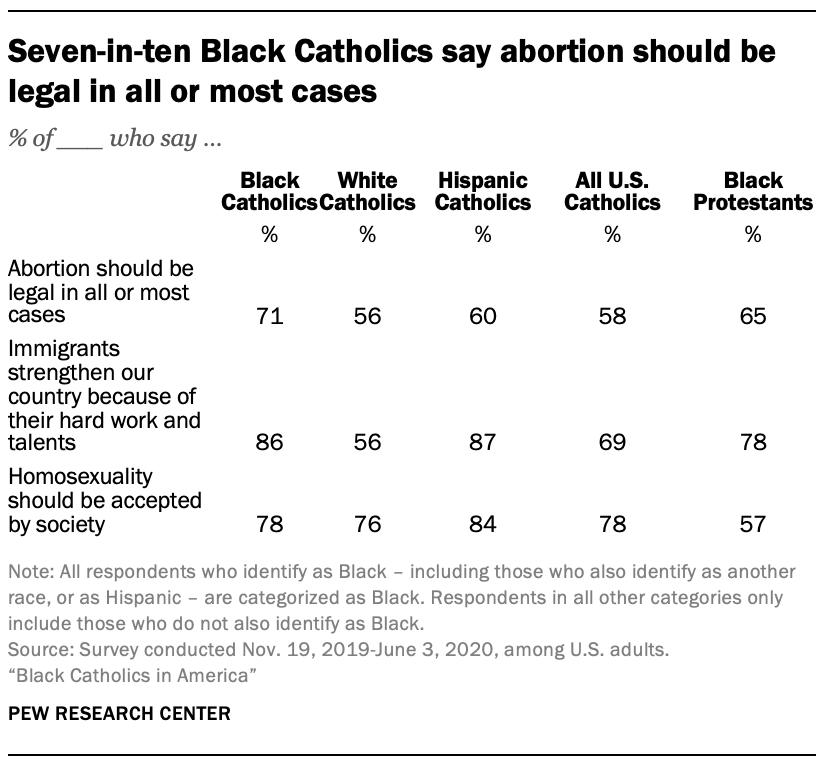
While the Roman Catholic Church opposes abortion, most Black Catholics (71%) say it should be legal in all or most cases. This is a higher level of support for legal abortion than is seen among U.S. Catholics who are Hispanic (60%) or White (56%).
Black Catholics also are more likely than White Catholics to say they believe that immigrants strengthen society. More than eight-in-ten Black (86%) and Hispanic (87%) Catholics say that immigrants “strengthen our country because of their hard work and talents,” compared with 56% of White Catholics who say this.
Asked whether homosexuality should be accepted by society, Black Catholics (78%) are about as likely as White (76%) and Hispanic (84%) Catholics to say that it should. Black Catholics are much more likely than Black Protestants (57%) to take this position.
Age, U.S. region and country of origin
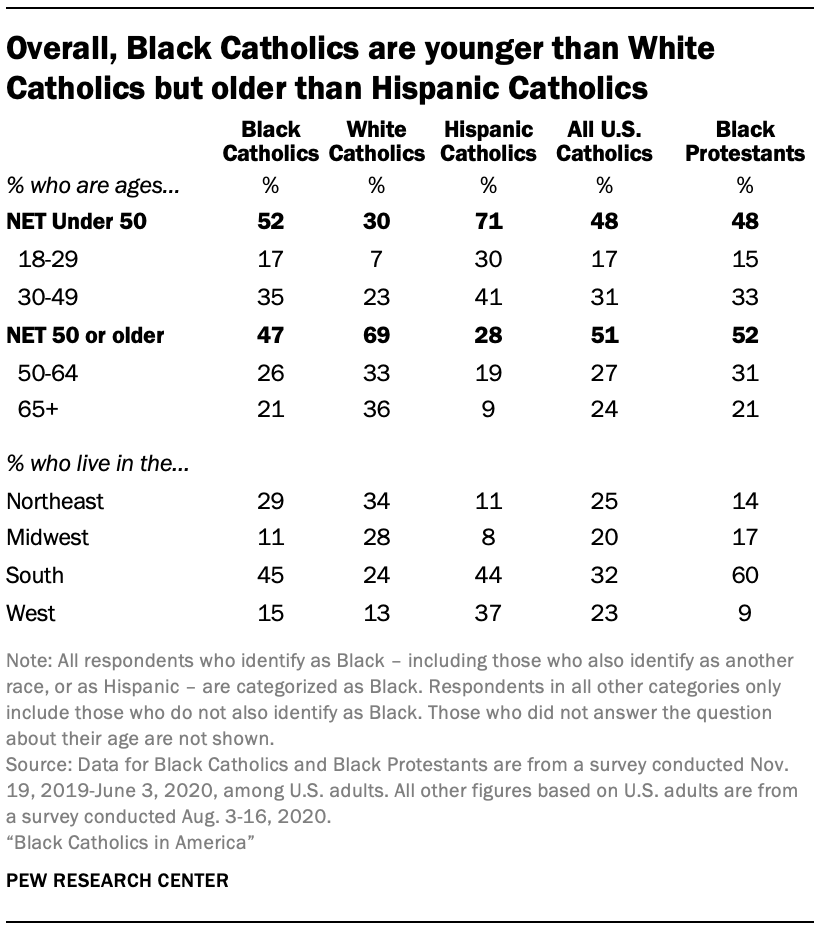
Demographically, the Black Catholic population falls in the middle of the White Catholic and Hispanic Catholic populations when it comes to age: Black Catholics are older than Hispanic Catholics but younger than White Catholics. For example, about half of Black Catholic adults are under age 50 (52%), compared with 71% of Hispanic Catholics and 30% of White Catholics.
Looking at the Black Catholic population regionally within the U.S., there are more Black Catholics in the South than in any other region. Overall, 45% of Black Catholics in the U.S. live in the South, while roughly three-in-ten (29%) live in the Northeast. An additional 15% live in the West, and 11% live in the Midwest.
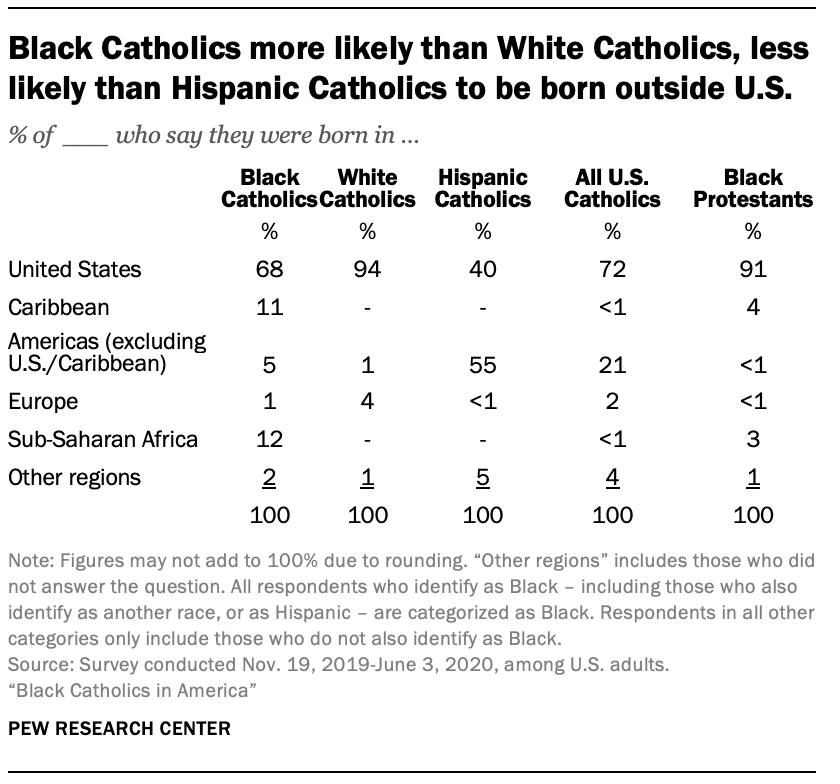
Around two-thirds of Black Catholics (68%) were born in the U.S., versus 40% of Hispanic Catholics and 94% of White Catholics. The most common regions of origin for Black Catholic immigrants are sub-Saharan Africa (where 12% of all Black Catholics in the U.S. were born), the Caribbean (11%) and other parts of the Americas (5%).
The survey also shows that Catholicism has a greater presence among Black immigrants than among U.S.-born Black adults. One-in-five Black immigrants from sub-Saharan Africa say they are Catholic, as do 15% of Black immigrants from the Caribbean. By comparison, just 5% of U.S.-born Black adults identify as Catholic.




